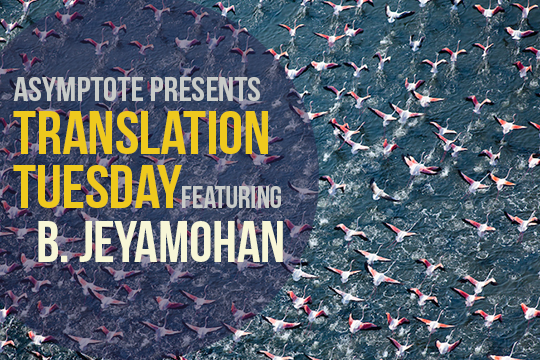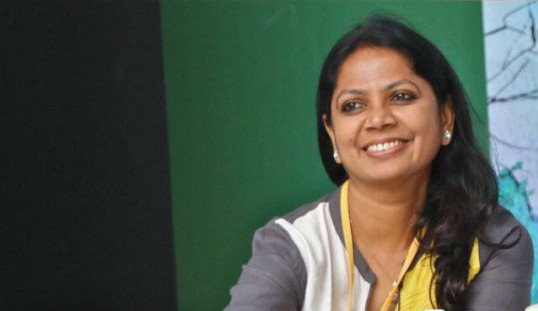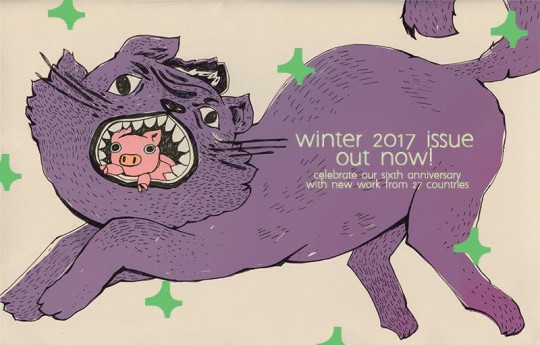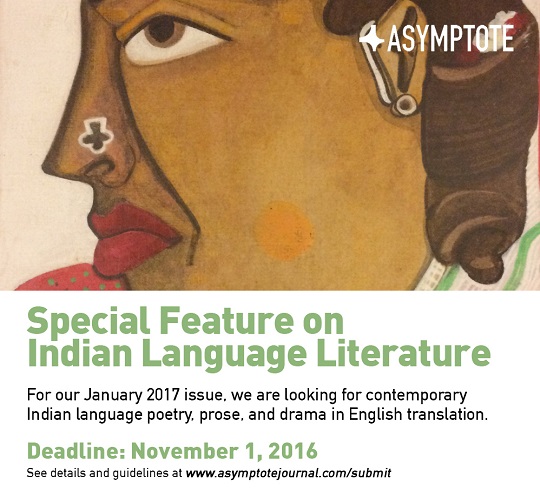Your weekly world tour kicks off in Indonesia this week, where we’ll hear about writers receiving special honors and new books out in Indonesian and English. Then we’ll jet to Spain because some of the biggest literary awards are being announced right now! And our final destination will be India, where…
Tiffany Tsao, Editor-at-Large for Indonesia, has some serious scoop:
In commemoration of the writer Sapardi Djoko Damono’s seventy-seventh birthday late last month, seven books were launched at the Bentara Budaya Jakarta cultural institute in South Jakarta: one new novel and six new editions of Sapardi’s previously published poetry collections. The novel, entitled Pingkan Melipat Jarak [Pingkan Folds Distance] is the second installment of a trilogy, the first novel of which is titled Hujan Bulan Juni [June Rain]. Sapardi is widely considered Indonesia’s pioneer of lyrical poetry. Well-known writer and journalist Goenawan Mohammad opened the evening with a few words about Sapardi’s work, followed by poetry readings—including musical renditions—by writers and musicians.
Several writers from the province of West Sumatra have put forth a proposal that the poet Chairil Anwar be officially recognized as one of Indonesia’s national heroes. Born in the Sumatran city of Medan in 1922, Chairil wrote poetry until his untimely death in 1949 at the age of 27. Critics consider his poetry to be revolutionary on several levels, notably his engagement with the Indonesian struggle for independence at the time, his introduction of Western-influenced themes into Indonesian poetry, and the groundbreaking way he wielded bahasa Indonesia, or Indonesian—the new official language of the nascent nation.
Feminist fiction writer and essayist Intan Paramaditha’s short-story collection Sihir Perempuan [Black Magic Woman] will be rereleased at the end of April by Indonesian publisher Gramedia Pustaka Utama. The collection was originally published in 2005 and shortlisted for the Kusala Sastra Khatulistiwa Award.
The English translation of the Indonesian bestseller Perahu Kertas [Paper Boats], written by Dee Lestari will be released on May 1 by Amazon’s literature-in-translation imprint AmazonCrossing. Paper Boats is one of the seven Indonesian works that AmazonCrossing announced it would publish at the 2015 Frankfurt Book Fair, at which Indonesia was the guest of honor. Last year saw the publication of Nirzona by Abidah El Khalieqy and translated by Annie Tucker, and The Question of Red, written in English and Indonesian by Laksmi Pamuntjak.
Editor-at-Large Carmen Morawski reports from Spain:
April is an important month for prizes in the Spanish literary world and as such, let’s begin with the most prestigious. Equivalent to the Nobel Prize for Spanish literature, the 2016 Cervantes Prize, will be awarded on April 23 to Eduardo Mendoza for his contribution to Spanish letters. Created in 1975, the prize is awarded on April 23 to coincide with Día del Libro (World Book Day), the day selected by UNESCO to honor both Shakespeare and Cervantes, who died on the same calendar date though not on the same day. At 125,000 euros, it is Spanish literature’s biggest award for Castilian language writers, with recipients alternating each year between Latin America and Spain.
Also of note, the 2013 Cervantes award winner, Elena Poniatowska, presided over this week’s announcement of the 2017 Alfaguara award for the novel, Rendición, by Ray Loriga which, according to ABC, was described by Poniatowska as both a “Kafkaesque and Orwellian history on authority and collective manipulation.” Citing Juan Rulfo among his influences, this multitalented author, screen writer, and director, Jorge Loriga Torrenova, who is better known as Ray Loriga, chooses to describe his dystopic science fiction novel as having “little science.”
Also worth mentioning is the 2017 Premio Azorín awarded to the Basque author from Bilbao, Espido Freire, for her novel, Llamadme Alejandra [Call Me Alexandra] about the last Russian Tsarina. Created in 1994, as a joint venture between the provincial government of Alicante and the Spanish publisher Editorial Planeta, the prize carries the pseudonymous name Azorín, used by Augusto Trinidad Martínez Ruíz of the “Generation of 98,” to sign his work. To learn more about this important member of the Generation of 98 don’t miss ABC’s tribute to Azorín in this week’s culture section commemorating the 50th anniversary of his death.
Finally, and certain to be of interest to Asymptote readers, is Laura Salas Rodríguez’s Spanish translation from the original French of Bosnian writer Velibor Colic’s Manual de exilio [Manual of Exile], available from Periférica. Based on his experience as a Balkan war refugee in France, Colic’s novel is particularly relevant now given the global refugee crisis. Be sure to read this Letras Libres interview, “Exile is Apprenticeship”, in which Colic discusses the paradox of writing in French, a language he didn’t begin to learn until the age of thirty.
And Assistant Managing Editor Janani Ganesan checks in with us from India:
As festival season wraps, it’s becoming clear that one festival in particular made its mark this year. Not one of the literary heavyweights in the country (like the Jaipur Literature Festival), but the lesser-known Bookaroo, a children’s literature festival in its ninth year, came into the limelight when it won the Literary Festival of the Year award at the London Book Fair (LBF). You can read an interview with the organizers of the festival here.
At a time when, not only in India but also in countries across the world, there is a noticeable shift towards tightening borders and a clinging on to an “ahistoric” nationalism, this in-depth interview with historian Romila Thapar provides an understanding of the new phenomenon. In a five-part conversation with the India Cultural Forum—an organization that focusses on issues of concern to writers, educators, and cultural practitioners—Thapar says about nationalism, “We are at the moment today when nationalism means territory. We are all nationalists in our own way and our debate on nationalism in a post-independent nation like ours is yet to be broad-based and public.”
Vivek Shanbag’s Ghachar Ghochar, the first book translated from Kannada to have a release in the U.S (in February), has had a grand reception with a 1000-word New York Times review—a welcome sign for translated literature from the country.
On the other hand, Indian language writing faced a sad month with the passing away of the legendary Tamil writer Ashokamitran in late March. A prolific writer with 200 short stories, 20 novellas, and 8 novels to his name, he brought into being a unique literary history in the country. This exhaustive tribute by one of his translators, N Kalyan Raman, compares his work and life to those of his contemporaries, shedding light on what distinguished Ashokamitran from his colleagues. As the translator notes, his 200 short stories “belong to one indivisible world and can be experienced as the one big story in which we may all find ourselves.” Other tributes to Ashokamitran have also pointed out and lamented the obscurity of a writer, who should be read and reread much more widely.
*****
Read More Dispatches from Around the World:










